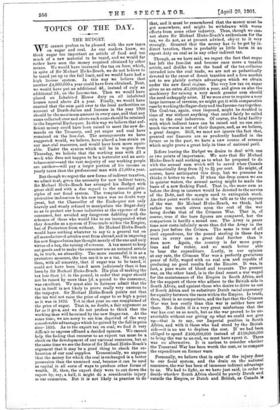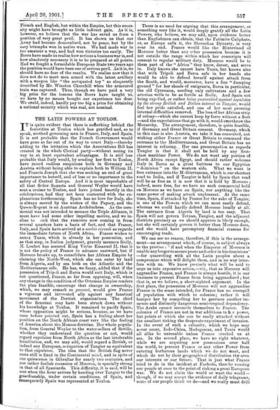TOPICS OF THE DAY.
THE BUDGET.
WE cannot profess to be pleased with the new taxes on sugar and coal. As our readers know, we think sugar too important an article of food and too much of a raw material to be taxed, and we would far rather have seen the money required obtained by other means. We would have increased the tax on beer, which, in spite of Sir Michael Hicks-Beach, we do not believe to be taxed vet up to the full limit, and we would have bad a high license system. In this way we believe that another £4,000,000 a year could have been obtained. Next. we would have put an additional 4d.. instead of only an additional 2d., on the Income-tax. Then we would have placed an Inhabited House duty on all inhabited houses rated above £4 a year. Finally, we would have enacted that the sum paid over to the local authorities on account of Death-duties and licenses in the year 1.900 should be the maximum amount in every case, and that any sums collected over and above such sums should be retained in the Imperial Exchequer. In this way we believe that suf- ficient money could have been raised to meet the new de- mands on the Treasury, and yet sugar and coal have remained on the free-list. The arrangements we have suggested would, we believe, have placed a less strain on our material resources, and would have been more equit- able. Under the system which will be in vogue from Thursday, we believe that the working man with £1 a week who does not happen to be a teetotaler and an anti- tobacconist—and the vast majority of our working people are neither—will pay a larger portion of his income in yearly taxes than the professional man with £1,000 a year.
But though we regret the new forms of indirect taxation, we admit that, given the necessity for new indirect taxes, Sir Michael Hicks-Beach has arranged his Budget with great skill and with a due regard to the essential prin- ciples of our fiscal system. The temptation to give a protective inclination to his new taxes was no doubt very great, but the Chancellor of the Exchequer not only bravely and wisely refused to manipulate the Sugar-duty so as to protect our home industries at the expense of the consumer, but avoided any dangerous dabbling with the schemes of those who would like to see inaugurated what they describe as a system of Free-trade within the Empire, but of Protection from without. Sir Michael Hicks-Beach would have nothing whatever to say to a general tax on all manufactured articles sent from abroad,and in imposing his new Sugai -duties has thought merely of the one and only virtue of a tax, the raising of revenue. A tax meant to keep out goods and to make the consumer use an untaxed article is, in truth, an absurdity. The more successful it is as a protective measure, the less use it is as a tax. We can say, then, with all sincerity, that if sugar was to be taxed, it could not have been taxed more judiciously than it has been by Sir Michael Hicks-Beach. His plan of making the tax less than id. in the pound, in order that sugar should not be raised by more than id. a pound to the consumer, was excellent. We must also in 'fairness admit that the tax in itself is not likely to prove really very onerous to the taxpayer. Sir Michael Hicks-Beach points out that the tax will not raise the price of sugar to so high a point as it was in 1893. Yet in that year no one complained of the price of sugar. That is, no doubt, a fair argument as far as it goes, and we do not profess to think that the working man will be ruined by the new Sugar-tax. At the same time, we are sorry to see him deprived of the very considerable advantages which he gained by the fall in price since 1893. As to the export tax on coal, we find it very difficult to express offhand a decided opinion. We cannot help the feeling that recourse to an export tax must be a check on the development of our national resources, but at the same time we see the force of Sir Michael Hicks-Beach's argument that it may be a good thing to check the ex- haustion of our coal supplies. Economically, we suppose that the money for which the coal is exchanged is a better possession than the unmined coal, because it can be used as capital in all sorts of ways to produce other fornii of wealth. If, then, the export duty were to cut down the export by, say, a half, it might do a considerable injury to our commerce. But it is not likely in practice to do that, and it must be remembered that the money must be got somewhere, and might be withdrawn with worse effects from some other industry. Thus, though we can. not share Sir Michael Hicks-Beach's enthusiasm for the tax, we do not, as at present advised, object to it very strongly. Granted that the money has to be got by in- direct taxation, there is probably as little harm in an export duty on coal as in any other indirect tax.
Though, as we have said, we regret the fact that sugar has left the free-list and become once more a taxable article, and dislike to see the hand of the tax-collector intruded into the coal trade, we are not so pedantically devoted to the cause of direct taxation and a free market not to see plainly certain advantages which we obtain under the new fiscal regime. The very low tax on sugar gives us an extra £5,000,000 a year, and gives us also the machinery for raising a very much greater sum should • the need unhappily arise. If we were ever to require a very large increase of revenue, we might get it with comparative ease by working the Sugar-duty and the Income-tax together. The Coal-tax, again, once imposed, might be doubled in time of war without anything that could fairly be called ruin to the coal industries. Of course, the fatal facility with which indirect taxes can be raised and no one seem much the worse is one of their dangers, and, as we believe, a great danger. Still, we must not ignore the fact that, granted our finances are as prudently handled in the future as in the past, we have a new source of revenue which might prove a great help in time of national peril Before leaving the Budget we desire to deal with one or two points of importance. We note that Sir Michael Hicks-Beach said nothing as to what he proposed to do with the annual sum which will be saved when Consols automatically drop from 21 to 2i per cent He might, of course, have anticipated this drop, but we presume he thinks it better to wait. If when the drop comes we are in quieter waters, the annual saving might be made the basis of a new Sinking Fund. That is, the same sum as before the drop in interest would be devoted to the service of the Debt, and the margin used to extinguish stock. Another point worth notice is the talk as to the expense of the war. Sir Michael Hicks-Beach, we think, laid rather too much stress upon the cost of the war being doulale that of the Crimean War. That is, of course, true if the bare figures are compared, but the comparison is hardly a sound one. The Army in peace time now costs infinitely more than did the Army in the years just before the Crimea. The same is true of all civil expenditure, for the pound sterling in those days went in every case a great deal further than it does now. Again,, country is far more popu- lous and far richr, and so much better able to bear the expenditure. Lastly, in our opinion at any rate, the Crimean War was a perfectly gratuitous peace of folly, waged with no real aim and capable of producing no good results for the Empire. It was, in fact, a pure waste of blood and treasure. The present war, on the other hand, is in the final resort a war waged for the maintenance of the Empire in South Africa. and for the support of those who adhere to the British side in South Africa, and against those who desire to drive us out of South Africa and to substitute Dutch racial supremacy for equality between the races within the Empire. In truth, then, there is no comparison, and the fact that the Crimean War was less costly than this war is neither here nor there. No doubt it is a very great misfortune that the war has cost us so much, but as the war proved to be un- avoidable without our giving up what we could not give up—that is to say, our Imperial position in South Africa, and with it those who bad stood by the British side—it is no use to deplore the cost. If we had been obliged to spend £400,000,000 instead of £150,000,000 to bring the war to an end, we must have spent it. There was no alternative. It is useless to consider whether the Transvaal War has been worth the cost, or to compare the expenditure on former wars.
Personally, we believe that in spite of the injury done to our fiscal system, and the drain on the national resources. the war has been of immense indirect advantage to us. We had to fight., as we have just said; in order to decide whether South Africa should be purely Dutch and outside the Empire, or Dutch and British, as Canada is Pim& and Engliab,.but within the .Empire, but this neces- sity might have brought us little indirect gain.: As it is, however, we believe that the war has saved us from a position of very great peril. It has shown us that our Army had become demoralised, not by peace, but by the easy triumphs won in native wars. We had made war in too amateur a way, and had won victories too easily. The Boers have made us realise how serious a business war is, and bow absolutely necessary it is to be prepared at all points. Had we fought a formidable European State two years ago the position would have been one of serious peril. 'As it is, we should have no fear of the results. We realise now that it does not do to meet men armed with the latest artillery with a weapon like "the antiquated toy" so eloquently described by Mr. Winston Churchill when the armoured train was captured. Thus, though we have paid a very big price for the lessons the Boers have taught us, we have by no means bought our experience too dear. We could, indeed, hardly pay too big a price for obtaining a national security which was real, not nominal.







































 Previous page
Previous page